When trivia is your living: Meet Spain’s professional game show contestants
A group of Spaniards has turned television quizzes into a job that can earn them millions in prize money. Here they share their winning formulas, and reveal the hard work that success requires
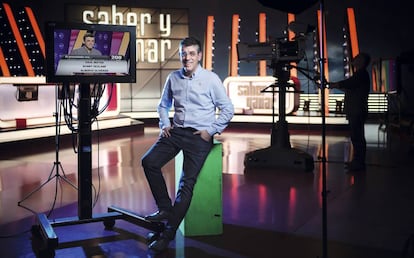
Crane operator Juanpe Gómez became a game-show contestant as a means of dealing with the fall out from the economic crisis, but now he has little idea what to do with his million-euro prize money.
Laid off in 2009, he started by entering the odd minor show but as his success grew, so did his ambition. Soon he was preparing for Pasapalabra, a Spanish TV show that focuses primarily on vocabulary and attracts as many as 26% of viewers in its time slot. “I approached it as if it were a civil servant exam,” he says.
He had always been keen on reading but now it was a case of studying reduced versions of the Spanish Royal Academy and María Moliner dictionaries. “I also went through encyclopedias and got up to speed on current affairs.”
Juanpe is small in stature and restless by nature and he gets excited when he recalls how he identified the “strange” surnames of prize winners of the Planeta and Nobel prizes and candidates of an election in Peru. His research won him €1.6 million.
The contestants who get furthest are not necessarily the cleverest; but they are the most prepared. Before getting in front of the cameras, they spend several years mugging up. They treat the preparation like a job, with strict schedules and strategies. In fact, many say these programs have become a professional undertaking.
This was certainly the approach taken by Juanpe Gómez, Paz Herrera and Antonio Ruiz, all of whom have won prizes of over a million euros on Pasapalabra, a show presented by Christian Gálvez on Telecinco. Of course, there is tax to pay on the winnings, which can be anywhere between 19% and 45%. In the case of Juanpe, Paz and Antonio, it was 45%, which still left them with an eye-watering sum.
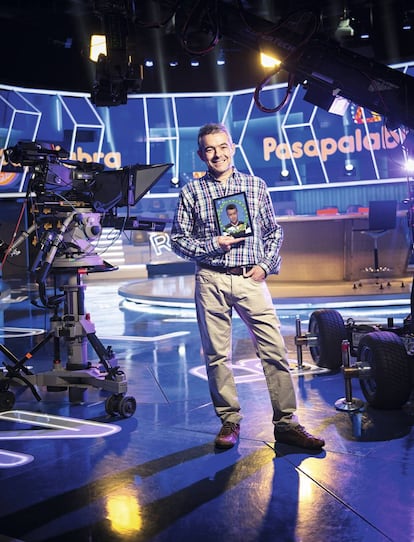
All three studied hard for the cash. They jotted down every word they read or heard and sought out its exact definition. This stood them in good stead for the last part of the show, which involves working against the clock to find the words to fit 25 different definitions.
Signing up to appear on game shows is a long and rather tortuous process, involving rounds of auditions, first on the phone and subsequently in person. But once they get through, there is a real feeling of community that grows between the contestants and the presenters, the crew and even the cleaners. When Juanpe, Paz and Antonio return to the Pasapalabra studios for this article, they are showered with hugs and kisses from all those who watched them survive round after round to win the jackpot.
There is no outward sign that this trio has come into big money, though they do discuss investment opportunities when they are alone. And they all fall silent when they hear the presenter ask the current contestant on the show what the word is for a definition. They can’t stop themselves from quietly mumbling the answer. They have become game-show buffs. Boom on Antenna 3 is another of their favorites.
Both shows have an average audience of close to 20%. The show with the biggest audience is Channel 2’s Saber y Ganar – know and win. Trumping all the other game shows on the same channel, it has an audience of almost a million, despite the fact that it has been on for 22 years and its prizes are less extravagant.
When confronted with the question: “Beginning with the letter S. The surname of the author and composer of the musical suite The Carnival of the Animals in 1886,” architect Paz Herrera, 54, answered Saint-Saëns and went home €1.3 million richer in 2014.
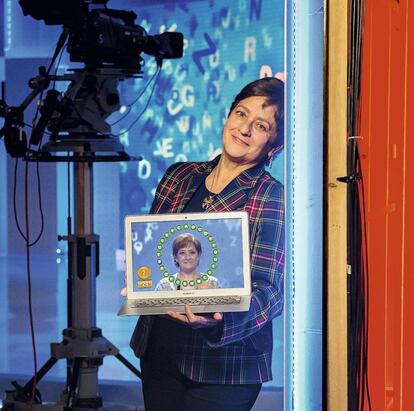
Receipts, bus tickets and papers from medical appointments were among the things she used to take notes on, as she tried to absorb all the information she could get her hands on. The architect had been a contestant on other game shows but the prize money on Pasapalabra was a definite incentive. “I understand that the shows are being approached professionally,” she says. “You don’t have a job, or you have something precarious and you’re not going to earn as much as €1.8 million during your entire working life. It’s like cramming for a civil servant exam but the result is more rewarding.”
As though she was commuting to work, she traveled down from Cantabria to Madrid every week to record the shows. She even jokes about having a contestant’s work contract; it was her only job during the crisis and it got her through.
Another contestant with a precarious employment situation was David Leo, a poet and Spanish language teacher who became a millionaire at 27. He started on a small scale in 2010 with forays into the game show world that earned him thousands of euros on one, and more than €50,000 on another.
When he set his sights on Pasapalabra, he adopted a methodical approach, studying for more than four hours every day over the course of two years and watching around 1,200 shows on the internet. He created flashcards for vocabulary, which he classified by semantic fields, and Excel spreadsheets with lists of words and historical figures. He studied using a computer program that takes into account the time it takes to forget a concept that has not been committed to memory.
When he felt he was ready for the challenge, he signed up and was in the studio from March until October 2016, appearing on more than 100 shows.
“I approached it as a job while I was on it, and with regard to what I could get out of it, but it is also vital to see it as a game because you have to enjoy it,” he says.
The answer that won him €1,866,000, the highest sum won in Telecinco’s history, was the word “ransom,” fitting the definition: “Rescue, money that is given in return for a hostage.”
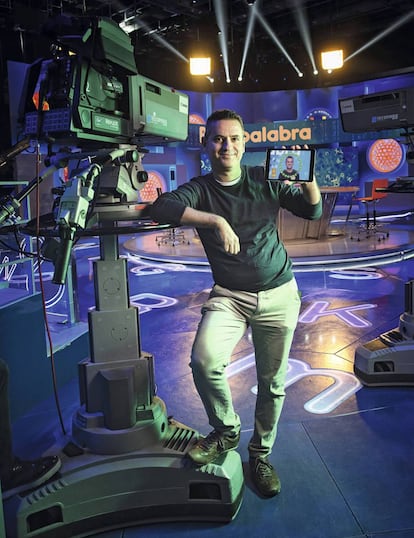
With the support of his mother and girlfriend, whom he phoned after each show, David had a ball and was not fazed by Christian Gálvez’s sense of humor. “I think I have options,” was his response to the presenter’s joshing when he only had three words left to guess. He smiled right through each show. He is still smiling now and giving Spanish classes, only today he does not having to worry about paying the bills.
For €1.1 million, Antonio Ruiz was asked: “It starts with J and is the surname of a politician considered the last leader of the socialist era in Poland, who was made head of government in 1981.”
His answer was “Jaruzelski.” Correct!
The windfall was welcome; as a musician, his income was far from steady. “I started [the game shows] because I liked them but it was also out of necessity,” Ruiz explains.
He studied hard for two years, compiling lists in notebooks. “It’s an interesting gamble,” he says. “Because there’s no guarantee you’re going to win. But if you’re good at it, it pays off.”
You’re not going to earn as much as €1.8 million during your entire working life Game show contestant Paz Herrera
Antonio still lives in the same house on the coast in Castellón in the Valencia region. He went on the program for his four-year-old daughter, he says, though it was hard to be away from her during the recording of the 126 shows he was on – a record at the time.
When Jerónimo Hernández failed to come up with the author who wrote American Psycho, he was eliminated from Pasapalabra. Now Bret Easton Ellis is a name he is unlikely ever to forget. His performance on the show was a disaster from day one. “It was a kamikaze plan,” he admits.
So he tried his luck on Saber y Ganar, a show more suited to his reflective temperament where he was crowned “The Magnificent” after 100 rounds.
“Each game show has its own particular preparation,” he says. “On Saber y Ganar, it is usually enough to have a good grasp of general knowledge and current affairs.”
Not a quitter, Jerónimo decided to give Pasapalabra a second try but this time he invested plenty of time studying with lists and flashcards. He knows there are computer programs that might help, but he prefers to work on paper. “Every 20 shows, they ask about a Nobel prize winner, so I look over them,” he says, pointing out that there are certain questions that invariably crop up.
Jerónimo works in the protocol department of Salamanca University and takes paid and unpaid leave to attend recordings. Not even the events of Salamanca University’s 800th anniversary could keep him away. Game shows have clearly become a passion and his tone changes dramatically as he talks about the competitions. “With so many people out of work, there is increasingly more need for entertainment,” he observes.
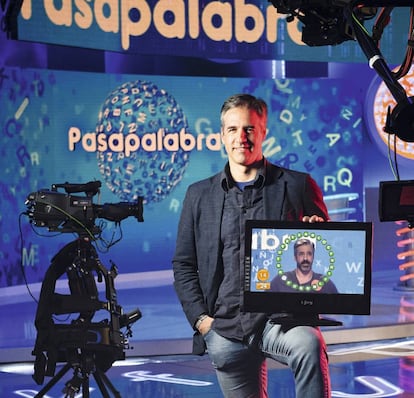
Like Paz Herrera and Jerónimo Hernández, many contestants hop from one show to another. First, they start with small shows such as Saber y Ganar, then they graduate to Pasapalabra until finally making it to Boom, the newest show featuring two teams of four that have to answer questions from any field. Many of these teams are made up of contestants from other game shows. Like in other programs, the contestants can appear on screen for weeks or even months, becoming almost household names by the time their winning streak ends for better or worse.
Saber y Ganar presenter Jordi Hurtado keeps in touch with former contestants and says the show has changed lives. He adds that different eras produce different types of contestants. During the crisis, for example, many had lost their jobs. Now he says there are a lot of younger contestants. “I tell them it’s not a civil servant exam and they shouldn’t treat it as such,” he says. “But they are very nervous when they come on.”
Spanish teacher David Leo became a millionaire at 27 thanks to ‘Pasapalabra’
Different game shows naturally suit different contestants. While physics graduate Paco de Benito did not walk away with the booty on Pasapalabra, he had more luck on the Spanish version of Survivors, a program that sends its contestants to an island where they have to get by on few resources by overcoming certain physical challenges.
Paco remembers trying to study the dictionary for Pasapalabra, a task he found “impossible.” However, his knowledge of computer programs allowed him to create a game in which the words he learned disappear. “I studied whenever I had time,” he says. “If it was weekend and I had eight hours, then I’d use them.”
A number of contestants who had met on Saber y Ganar, formed Los Lobos and Las Extremis teams to compete on Boom. “We study a lot,” says Montserrat Cano. Unfortunately, Las Extremis team broke up when two team members had to return to their medicine and law degrees after recording 100 shows.
Las Extremis divided the work up between them. “We got together before the show was recorded and shared knowledge and trivia,” says Cano, who admits that she was in it for the money. “It requires time, effort and preparation. General knowledge is not profitable, it doesn’t count on your CV, but it can be useful on game shows.”
National flags, science and physics trivia as well as dialects were among Las Extremis team member Amparo Bermejo’s specialized subjects. “We looked for internet sites featuring trivia,” she says, explaining that they would study questions from other shows and put in three or four hours a day. “Like a civil servant exam,” she says. “They offer so much money that it’s an attractive proposition.”

Meanwhile, Las Extremis’ Gloria Camacho says that at first she had no idea you could prepare for a game show, but she soon got the hang of it. “I know that teaching is my job, but it’s also true that if you win the jackpot, you have enough to set up a business or take a few years off.”
The fourth member of Las Extremis team, Cristina Morales, was a fan of Saber y Ganar from the age of 12 and remembers wanting to be as clever as the contestants on it. With a view to becoming a Boom contestant, she studied names in sport for three to four hours a day. “It’s the best paid work we’ll ever get,” she says. “I don’t think anyone wants to be a professional contestant but it’s true that once you realize it’s just about studying, you get into it.”
Meanwhile, the invincible Los Lobos team members like to keep their winning formula close to their chests. But as the program’s presenter Juanra Bonet has said on occasion, they study intensely. “Two of them don’t have jobs,” he says. “They spend all day training, and that shows.”
Still, even Los Lobos occasionally get a question wrong, like when they failed to come up with the capital of Barbados. “You should know that,“ Bonet said, ticking them off. “Capital cities are the staple of game shows!”
English version by Heather Galloway.
